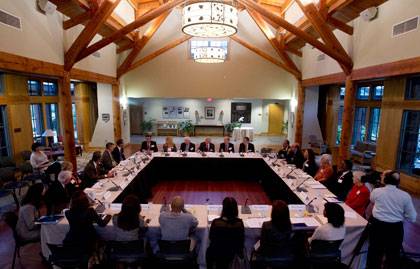
How can scholars make a case for the humanities to non-academics when the word itself only resonates with humanists?
So began the discussion during a regional forum of the national Commission on the Humanities and Social Sciences co-chaired by Duke University President Richard Brodhead Friday morning at the Doris Duke Center.
Nearly two dozen North Carolina-based English and social studies teachers, arts administrators and educational policy leaders gave Brodhead their impressions of the state of the humanities.
The question before the panel is how to bolster teaching and research in the humanities and social sciences at a time when public support and student enrollments are falling even as the critical thinking skills the humanities provide become more essential to solving society's most pressing problems.
Attendees included former N.C. Gov. Jim Hunt; the interim chancellor of North Carolina Central University, Charles Becton; N.C. poet laureate, Joseph Bathanti; the executive director of the Full Frame Documentary Festival, Deirdre Haj; and the president of the National Humanities Center, Geoffrey Harpham. Local universities, high schools and museums were also represented.
"We have an array of resources in this area that you can't find in any one place," said Brodhead admitting that an "arsenal of arguments" is needed to raise the profile of the discipline.
The commission was convened last year by the American Academy of Arts and Sciences in response to a request by a bipartisan group of congressmen and senators. Brodhead and co-chair, John Rowe, chairman emeritus of Exelon Corp., are conducting a series of forums around the country and plan to distill what they learn into a report for legislators.
"We're hoping to have more ammunition to mobilize Washington, states and local communities," Brodhead said.
To give the humanities more prominence, Hunt suggested tying it to the economy.
"You need to get Congress to listen to you for an hour," Hunt said, encouraging the use of pro-humanities business executives.
Duke English professor Cathy Davidson added that one challenge for the humanities is thinking too narrowly about the importance of their field. The humanities are crucial in preparing students for a productive, fulfilling life.
"Humanists think something is wrong with thinking what we do is vocational training," she said. "It's a value system we have to get over because it's causing our own marginalization."
Full Frame's Haj said humanists must reach out to the public. She offers a documentary education program that is free for public school teachers so they can introduce more students to film and overcome perceptions of elitism.
As a result, Haj said audience diversity for the festival has increased and she said "the student becomes a citizen, a voter, someone engaged with civics."
Benjamin Filene, the director of public history at UNC-Greensboro, said the humanities needs to reframed, perhaps renamed.
"If you survey people asking them 'how much do you care about history?' They'll say not very much. But ask about the past and they care very deeply about the past. Their own personal past has meaning and relevance to them."
All speakers agreed the humanities offer a deeper self-understanding and are key to solving the problems of the future. Several shared examples of how they've bypassed traditional classroom learning to provide supplemental humanities education.
Tracy Mancini, the assistant dean of Durham Technical Community College, hosts a poetry hour inviting students, faculty and staff to deconstruct a poem, "thinking about the words, how they sound, what they mean to you and other people."
Chapel Hill social studies teacher Erin White said we have to rethink what it means to be literate in the 21st century. Students must have an interdisciplinary, global and technology based understanding of the world in the age of the Internet.
Others warned of the consequences of ignoring the humanities. China, for example, has many strengths, said Harpham of the National Humanities Center, but there is a weakness.
"Chinese students will swarm a problem but there's no innovation," Harpham said. As a result, they are looking to the United States for help to strengthen their humanities education. "We think in order to compete with them we have to revise, or refashion our system but that misses the point."
Todd Roberts, the chancellor of the North Carolina School of Science and Mathematics, gave the perspective of "an English teacher at a STEM school."
"Grand challenges can't be solved by science and technology alone," he said.
"When you talk about advocacy, it suggests someone doesn't like it, someone doesn't want to do it," Brodhead said. "No one is against learning how to read. There is indeed passion for these things. It's partly a question of not just how to create a case for the humanities, but how to create an appetite."
Below: Duke President Richard H. Brodhead talks with former NC Gov. Jim Hunt at the forum. Photo by Jon Gardiner/Duke University Photography
